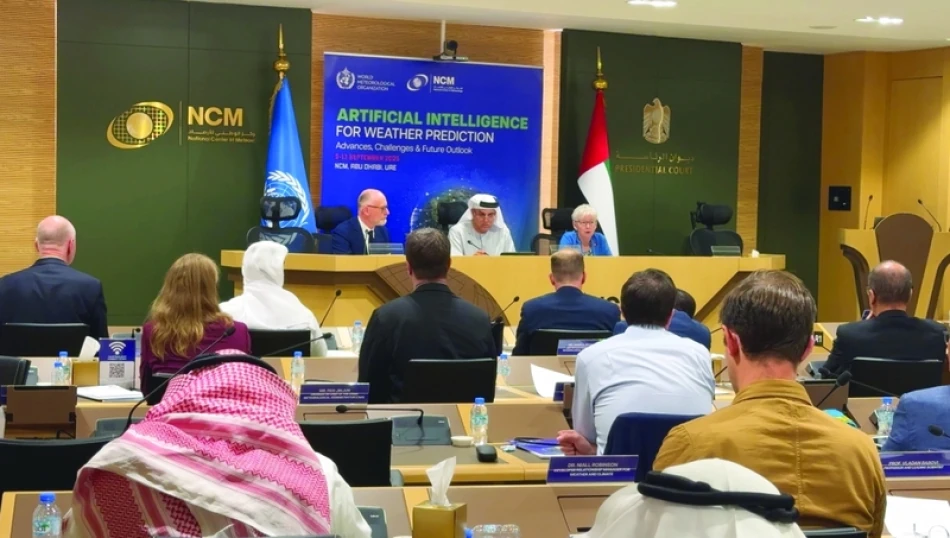
Groundbreaking AI Weather Forecasting Conference Concludes
AI Weather Forecasting Revolution: Global Meteorological Community Charts Path to Democratized Climate Predictions
The intersection of artificial intelligence and meteorology is poised to fundamentally transform how the world predicts and responds to weather patterns, as global experts concluded a landmark conference in Abu Dhabi that outlined an ambitious roadmap for making advanced forecasting accessible to all nations. The gathering signals a critical shift toward AI-driven meteorological systems that could bridge the dangerous gap between developed and developing nations in climate preparedness.
A Paradigm Shift in Global Weather Intelligence
The World Meteorological Organization (WMO) conference, hosted by the UAE's National Center of Meteorology, brought together researchers, national weather agencies, and industry leaders to address a pressing reality: traditional weather forecasting methods are insufficient for an era of climate volatility. Participants emphasized that AI integration represents not just an upgrade, but a qualitative transformation that could democratize access to life-saving weather information.
This shift comes at a crucial time. Climate change has intensified extreme weather events globally, while many developing nations lack sophisticated early warning systems. The conference's focus on "equitable and inclusive" distribution of weather benefits reflects growing recognition that meteorological inequality can be a matter of life and death.
The Technology Infrastructure Challenge
Open Data as the Foundation
Conference participants identified open data and standardized tools as fundamental prerequisites for AI-powered weather systems. This approach mirrors successful models in other sectors, where open-source frameworks have accelerated innovation while reducing costs. The emphasis on human-centered design suggests a departure from purely technical solutions toward systems that consider user accessibility and local contexts.
Bridging the Digital Divide
The conference highlighted a critical challenge: ensuring that AI weather systems don't exacerbate existing inequalities. Many regions currently lack basic early warning systems, and there's a risk that advanced AI tools could widen this gap. The proposed focus on regional implementation and local data integration indicates an understanding that one-size-fits-all solutions won't work in meteorology.
Market and Economic Implications
The push toward AI-driven weather forecasting represents a significant opportunity for technology companies and meteorological service providers. However, the conference's emphasis on open collaboration and equitable access suggests that traditional business models may need adaptation. Companies that can balance commercial viability with public benefit access are likely to emerge as leaders in this evolving market.
For governments, the initiative implies both opportunity and obligation. Nations investing in AI meteorological capabilities now could gain substantial advantages in agricultural planning, disaster preparedness, and economic stability. Conversely, countries that lag in adoption may find themselves increasingly vulnerable to climate-related disruptions.
Maintaining Trust in an AI-Driven Future
One of the conference's most significant conclusions was the reaffirmation that national meteorological services must retain their official warning authority. This decision reflects hard-learned lessons from other sectors where AI adoption created confusion about authoritative sources of information.
The emphasis on maintaining public trust through credibility and transparency addresses a key challenge in AI implementation: ensuring that increased capability doesn't come at the cost of public confidence. This approach contrasts with the "move fast and break things" mentality that has characterized some technology adoptions.
Global Standards and Governance Framework
The conference's interest in establishing shared principles and guidelines for responsible AI integration signals recognition that meteorology requires coordinated global standards. Unlike many AI applications that can operate in isolation, weather forecasting is inherently international—storms don't respect borders, and accurate predictions require global data sharing.
This governance approach positions the meteorological community ahead of many other sectors still grappling with AI regulation. By proactively establishing ethical frameworks and operational standards, weather agencies may create a model for responsible AI deployment that other industries could follow.
Strategic Implications for Climate Resilience
The Abu Dhabi conference represents more than a technical discussion—it's a strategic response to climate change that recognizes weather prediction as a critical component of global resilience. The focus on long-term sustainability and equitable benefit distribution suggests that participants understand the geopolitical implications of meteorological capabilities.
As extreme weather events become more frequent and severe, nations with superior forecasting abilities will have significant advantages in protecting their populations and economies. The conference's commitment to inclusive access reflects both humanitarian concerns and practical recognition that global weather systems require global cooperation to understand and predict effectively.
Most Viewed News

 Sara Khaled
Sara Khaled






